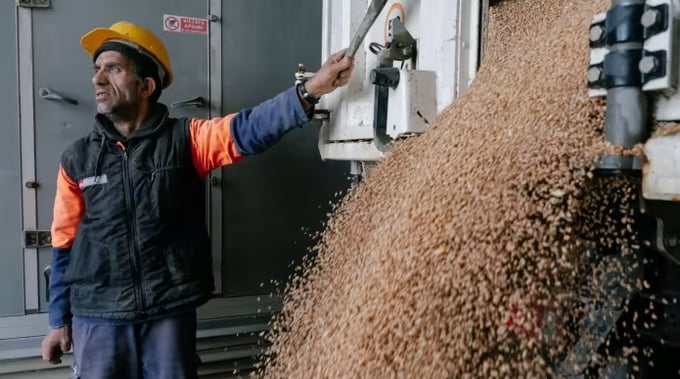November 25, 2025 | 13:23 GMT +7
November 25, 2025 | 13:23 GMT +7
Hotline: 0913.378.918
November 25, 2025 | 13:23 GMT +7
Hotline: 0913.378.918

Grain is unloaded at the port of Constanta in Romania: the country is affected by Ukrainian imports but has so far not imposed a ban. Photo: Andrei Pungovschi/Bloomberg
EU countries criticised Warsaw and other capitals on Tuesday for refusing to reverse unilateral import bans on grain from war-torn Ukraine.
Poland, Hungary, Slovakia and Bulgaria imposed varying restrictions more than a week ago on cereals and other foodstuffs following a glut building up on their local markets.
Several agriculture ministers criticised the unprecedented moves at a meeting in Luxembourg, pointing out that they were not backed by solid data and breached EU trade policy.
Czech deputy agriculture minister Miroslav Skřivánek accused the countries of shutting the door on a neighbour in need. “We as Czechs believe bans are not a good solution,” he said at a conference in Poland.
Recalling the accession of 10 mostly former Communist countries to the EU in 2004, he added: “The old member states were not afraid to let us on to their markets: now somebody is coming and knocking at our door and needing help.” Ukraine has applied to become a member of the EU and member states last year granted it official candidate status — a project spearheaded by Poland.
Polish officials argue that their country’s unwavering support for their neighbour’s struggle against Russian aggression is a separate matter.
“Poland is the number one country in the EU in terms of assistance to Ukraine but this cannot be done at the expense of Polish farmers,” said Polish state secretary for agriculture Janusz Kowalski.
He said that “customs duties should be imposed” particularly on grain but also on other foodstuffs that were competing unfairly with Polish products.
The EU dropped tariffs on Ukrainian foodstuffs and eased sanitary controls to support the country after Russia’s invasion last year. The measure expires on June 30 but is expected to be extended for another year.
The high cost of transport and bumper world grain harvests have left many supplies stuck in Ukraine’s neighbouring countries, cutting incomes for farmers there.
In Luxembourg Ukraine’s agriculture minister discussed the ban with European officials. Mykola Solskyi told EU agriculture ministers that farmers in the bloc needed Ukrainian grain to feed their livestock, and added that low grain prices were a result of a bumper harvest in Brazil, not Ukrainian production.
Several ministers intervened to condemn the unilateral measures, according to an EU official. “It‘s crucial that we do not put too many additional burdens on Ukraine,” said an EU diplomat.
European commissioners Valdis Dombrovskis and Janusz Wojciechowski also met representatives of the four countries plus Romania to broker a solution. Romania is also affected by the grain glut but has so far refrained from imposing the import ban.
Last week the five countries proposed restricting imports of five cereals, allowing them to transit only, along with €100mn of financial support for farmers. The group wants the measures extended to sunflower oil, flour, sugar, meat, dairy and other produce.
“The withdrawal of these measures may be considered only after market balance has been restored in the bordering member states or ones near the border,” said their joint submission to fellow EU ministers.
Samuel Vlcan, Slovak agriculture minister, told reporters the commission should buy grain together with the UN’s World Food Programme directly from Ukraine and co-finance its transport.
“This grain should be transported to those countries that were traditional markets of Ukraine, such as Egypt and other countries in Africa and Asia,” he said. “To put additional food into a saturated [European market] is a problem.”
(FT)

(VAN) Brazil's COP30 presidency pushed through a compromise climate deal on Saturday that would boost finance for poor nations coping with global warming but that omitted any mention of the fossil fuels driving it.

(VAN) Poultry farmers in the UK have been warned that they could face one of the worst winters yet for bird flu.

(VAN) Prices of main-crop paddy have risen sharply, with jasmine rice hitting 16,100 baht per tonne — the highest level in years.

(VAN) In Brazil, FAO unveiled a series of reports and initiatives showing how sustainable agrifood systems are a solution to the climate crisis.

(VAN) With names like neodymium and dysprosium, rare-earth elements sound exotic — and their perceived scarcity has only added to the mystique.

(VAN) In a new study published in Trends in Biotechnology, researchers used a gene-editing technology called CRISPR to increase a fungus's production efficiency and cut its production-related environmental impact by as much as 61%- all without adding any foreign DNA.

(VAN) A top official in Beijing’s Cop delegation says China is committed to clean energy – but US’s absence is a problem.